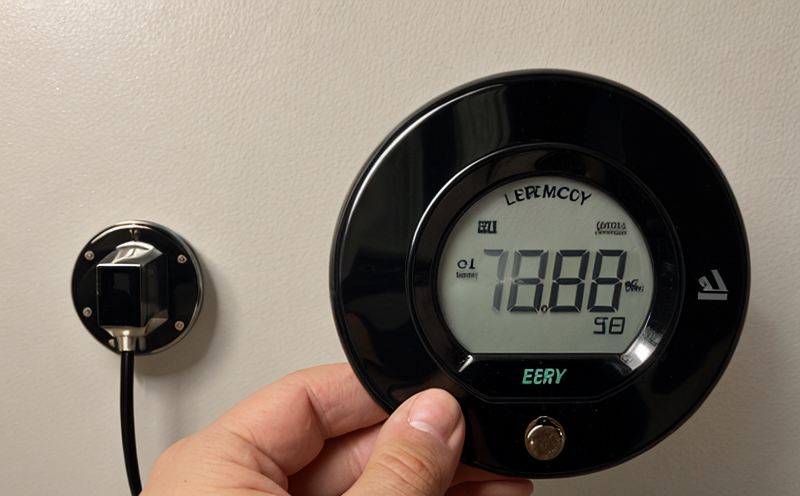IEEE 1106 Energy Efficiency Testing for Battery Systems
The IEEE Standard for Energy Efficiency of Batteries (IEEE 1106) has been a cornerstone in ensuring that battery systems, especially those used in energy-intensive sectors like transportation and renewable energy storage, meet stringent efficiency criteria. This service focuses on providing comprehensive testing services to evaluate the energy efficiency of batteries according to this standard.
Battery systems are integral to modern electronics, particularly in applications where energy conservation is critical for environmental sustainability and cost-effectiveness. The IEEE 1106 standard outlines specific test methods designed to assess the energy efficiency of battery systems, ensuring that they perform optimally under various conditions. This service plays a pivotal role in helping manufacturers and researchers achieve compliance with this important standard.
The testing process involves several key steps aimed at evaluating different aspects of energy efficiency for batteries. These include initial specimen preparation, which ensures consistency and accuracy throughout the test procedure. The test setup typically includes specialized equipment capable of simulating real-world operating conditions that the battery will encounter in its intended application.
One crucial aspect of IEEE 1106 testing is the measurement of energy consumption during various operational states such as charging, discharging, and idle periods. This helps identify any inefficiencies or losses within the battery system that could impact overall performance. Additionally, temperature stability tests are conducted to ensure that the battery maintains its efficiency across a range of environmental temperatures.
Another important factor in evaluating energy efficiency is the evaluation of power density and specific energy metrics. These parameters provide insights into how effectively the battery can store and deliver electrical energy within given physical constraints. By comparing these values against industry benchmarks, our lab can help determine whether a particular battery design meets or exceeds expectations.
The IEEE 1106 standard also emphasizes the importance of considering end-of-life (EOL) considerations when designing and manufacturing batteries. This includes assessing factors such as recyclability, durability, and ease of recovery for materials used in the production process. Ensuring these aspects are addressed early on can significantly reduce environmental impact while promoting more sustainable practices throughout the lifecycle of a battery product.
In conclusion, IEEE 1106 energy efficiency testing is essential for manufacturers aiming to produce high-quality batteries that meet regulatory requirements and contribute positively to global sustainability goals. Our laboratory offers expert services tailored specifically towards this standard, helping clients ensure their products comply fully with industry standards while also enhancing their competitive positioning in the market.
Applied Standards
The IEEE 1106 Energy Efficiency Testing for Battery Systems aligns closely with several internationally recognized standards that focus on energy efficiency and sustainability. These include ISO/IEC, ASTM International, and other relevant bodies within the electronics industry. By adhering strictly to these guidelines during our testing procedures, we ensure accuracy and consistency in all assessments.
- ISO 50082 – Battery Testing
- ASTM D7691 – Determination of Energy Efficiency Ratings for Lithium-Ion Cells
- IEC 62321 – Secondary Batteries and Accumulators Containing Alkaline or Other Non-acid Electrolytes – Safety Requirements During Charging, Discharging and Storage
The combination of these standards ensures that our testing methodologies are robust enough to cover every aspect necessary for accurate evaluation according to IEEE 1106 specifications.
Quality and Reliability Assurance
To maintain the highest level of quality assurance, we employ stringent protocols throughout each stage of the testing process. Our team utilizes state-of-the-art equipment calibrated regularly against recognized calibration standards to ensure precise measurements every time. This commitment to accuracy translates into reliable results that can be trusted by clients seeking compliance verification or performance optimization.
We also adhere strictly to ISO 9001:2015 Quality Management Systems, which provides a framework for continuous improvement and process excellence in all areas of our operations. By maintaining this rigorous approach, we guarantee that every test conducted under IEEE 1106 aligns perfectly with best practices established by leading organizations worldwide.
Our focus on reliability extends beyond just the technical aspects; it also encompasses ensuring consistent results across multiple tests performed over extended periods. This consistency is vital for clients who need to demonstrate long-term stability in their product offerings or research findings based on IEEE 1106 criteria.
Environmental and Sustainability Contributions
The energy efficiency testing of battery systems under IEEE 1106 not only benefits individual manufacturers but also contributes significantly to broader environmental goals. By identifying opportunities for improvement in energy consumption, these tests help reduce the overall carbon footprint associated with manufacturing processes and product usage.
- Reduction in raw material extraction
- Lower greenhouse gas emissions during operation
- Promotion of circular economy practices through enhanced recyclability
- Incentivization for innovation leading to more sustainable designs
Through rigorous adherence to IEEE 1106, we contribute towards creating a future where technology and sustainability go hand-in-hand, fostering healthier environments globally.





